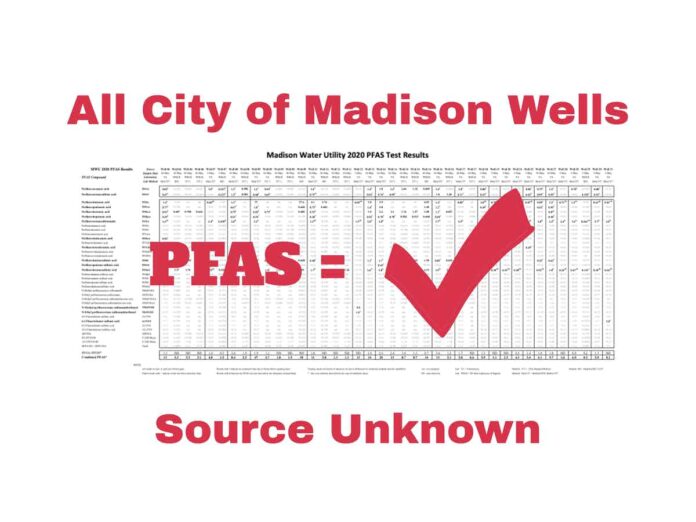Get your reverse osmosis or activated carbon filter now – every single city of Madison well was tested and PFAS chemicals were found in every single one of them.They released this on “bad news Friday”, and I didn’t want it to get buried in the weekend. Here’s the info they sent out.
Madison Water Utility finds trace amounts of “forever chemicals” in all city wells
Madison Water Utility has completed its annual comprehensive testing for a class of chemicals known as PFAS in the city’s drinking water wells. Results show at least some PFAS are present in every Madison well, with total amounts ranging from 2.5 to 47 parts-per-trillion. All wells tested show PFAS levels far below the proposed safe drinking water limit that is being considered by the Wisconsin Department of Natural Resources (DNR). PFAS chemicals are not yet regulated in drinking water, but a regulatory limit could be announced by the DNR as early as next year.
Some other states have already regulated PFAS in drinking water. All wells currently operating in Madison meet every PFAS standard or guideline set in other states.
“We are fortunate that levels are so low here in Madison. The same can’t be said for every community. When detected, PFAS were found at levels well below the safe level in drinking water recommended by Wisconsin Department of Health Services,” says Joe Grande, Water Quality Manager for Madison Water Utility.
“We’re going to keep testing and monitoring every well in the city using the best technology available, because this issue isn’t going away. These chemicals are still being manufactured and used in countless consumer products. Monitoring also helps us assess risk as new studies emerge that evaluate the potential health effects of these chemicals,” Grande says.
View complete 2020 testing results at all operating wells for more than 30 types of PFAS chemicals.
Compare proposed Wisconsin PFAS regulatory limit with levels found in Madison wells.
Madison Water Utility first began this in-depth testing for a broad spectrum of PFAS chemicals at all city wells in 2019 at the urging of community members who petitioned the Water Utility Board for comprehensive monitoring. Testing for PFAS isn’t required by state or federal regulators, and most communities in Wisconsin do not test drinking water for the compounds.
Over the past two years, Madison Water Utility has invested more than $30,000 testing Madison’s drinking water for PFAS chemicals.
False positives and estimated results
New analytical technology can detect PFAS chemicals down to a fraction of one part-per trillion. But looking for chemicals at such ultra-trace levels means that many detections reported by labs are too low to accurately quantify. Levels that are below two parts per-trillion are often reported as estimates. Some results may also be false positives.
“These tests allow for detection of PFAS chemicals at the sub-part per trillion level, which is incredibly small. However, the analysis is not perfect. In our results, PFAS were found in some of the laboratory method blanks, which are supposed to be PFAS-free. These ‘detections’ suggest the possibility of false positives for some chemicals found in some of our wells.”
Madison Water Utility will test all operating wells again in 2021.
Different types of PFAS compounds
Thousands of types of PFAS chemicals have been manufactured, but a handful have been well-studied or tied to known health risks. Most drinking water regulation focuses on two types of PFAS compounds called PFOA and PFOS, which have been phased out of use in the United States. Madison Water Utility detected PFOA and/or PFOS in sixteen wells. The estimated level of PFOA + PFOS found ranged from 0.5 to 3.4 parts per trillion. The DNR is considering imposing a safe drinking water limit of 20 parts per trillion for PFOA and PFOS in Wisconsin.
Madison Water Utility also found a broad range of other types of PFAS chemicals during its testing. Most types are not regulated by any state. Others are regulated at much higher levels than PFOA and PFOS.
For example, over 80% of the PFAS detected in Well 9 is a single chemical called PFBA. The most restrictive health-based guideline for PFBA in the United States comes from the Minnesota Department of Health and is set at 7,000 parts-per-trillion. Madison Water Utility found a total PFAS concentration in Well 9 of 47 ppt, with 37 ppt coming from PFBA.
At-home filters
While the very low levels of PFAS found in Madison wells don’t require large-scale wellhead treatment, Madison Water Utility often gets questions about at-home filters. It is possible to reduce PFAS chemicals in water using a home filter. A recent study by Duke University and North Carolina State University analyzed the effectiveness of a variety of household filters at removing PFAS from tap water.
About one percent of the water pumped to Madison homes is used for drinking and cooking. The rest is used for flushing toilets, doing laundry, dishes, outdoor watering and other needs.
Well 15
Madison Water Utility first discovered PFAS in two Madison wells in 2017 while conducting limited testing at wells near landfills and the airport. One of those wells – Well 15 located on East Washington Ave. – was shut down last year amid community concerns about PFAS chemicals found there. Madison Water Utility is currently undertaking a $50,000 feasibility study looking at possible PFAS treatment at Well 15 and other options. The utility believes the chemicals detected in that well likely migrated from Truax Air Field, about a mile away. It’s unclear where PFAS chemicals found in other city wells are coming from.
More Information
For full 2020 PFAS Test Results, a map of municipal wells, and previous test results, head to the Madison Water Utility PFAS information page. To receive test results right in your inbox, sign up for the PFAS Testing and News email list on the right hand side of the page.
Have questions about your drinking water?
Call Madison Water Utility’s Water Quality Department: (608) 266-4654
Or email water@madisonwater.org








